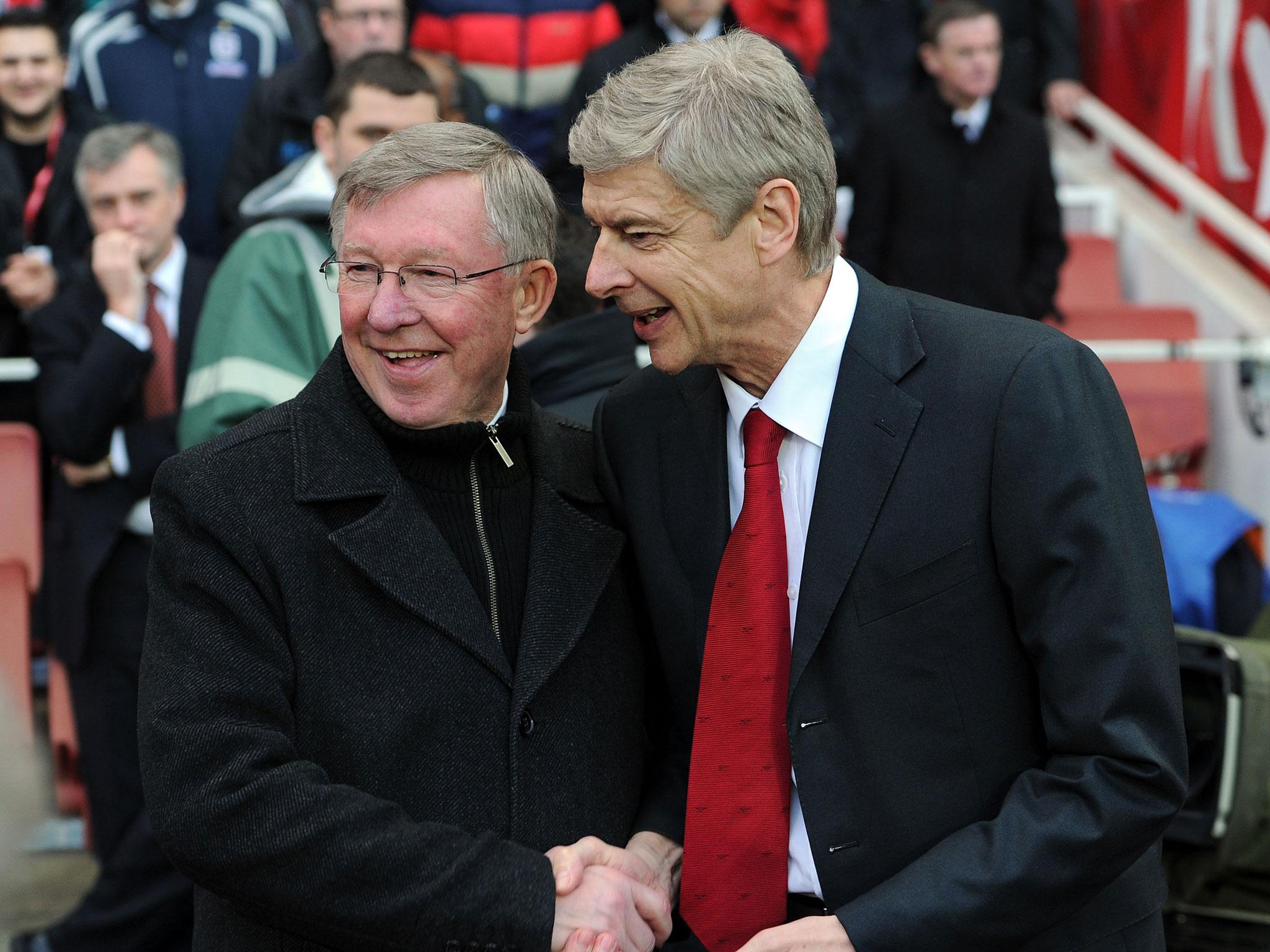Arsenal must learn from the error of Manchester United's ways when replacing Arsene Wenger
The Gunners could do worse than look north for guidance as they look to replace their own version of Sir Alex Ferguson, writes Ian Herbert

When he had gone, Manchester United described the process of trying to discover the keys to Sir Alex Ferguson’s system the footballing equivalent of attempting to locate a “black box recorder.” Simply issuing David Moyes and staff with iPads felt like progress. The intervening years have seen Moyes and Louis van Gaal staggering around in the dark, United spending £514m on players and the team are still below the so-called catastrophically failing Arsenal in the Premier League.
No wonder the thought of replacing Arsene Wenger is something the North London club’s board have been reluctant to instigate on the back of protests by supporters.
The key advantage Arsenal have over United, when it comes to making the change, is that the club will not be losing its chief executive and manager at the same time. The Glazer family’s loss of David Gill and Ferguson within a few weeks of each other was poor succession planning.
Arsene Wenger's worst Arsenal defeats
Show all 8But what the club can learn from United’s difficult and hugely expensive last few years is that investing everything in the new manager is not wise, when that individual will typically last four years at most, these days. (Moyes and Van Gaal had been and gone within that time.)
Supporters’ minds are already turning to the potential name of Wenger’s successor, but the biggest challenge is to decide on the direction and identity of a club and then hire a manager who fits it, says Mike Forde, the former Chelsea sporting director who now runs Sportsology, a consulting and software business which has helped NBA, NFL and NHL ownership groups recruit new head coaches.
“How you prepare for a change is important,” says Forde. “Who carries the momentum forward with respect to the way things are done around the team space? There’s a human void but there’s also a different oxygen you can’t see. How do you fill the gap between the known and unknown parts of a new leadership approach?
"When the succession comes, it is a moment for owners to take the time to understand what the brand and direction of the organisation actually is. What kind of people do they want inside the company? What is the team’s identity and style? Which coach might will further that? How do we want this team to be run on a day-to-day basis?
Forde worked with Sam Allardyce at Bolton before Chelsea and his experience of the potential turbulence that an incoming manager can cause at Premier League clubs - with rafts of staff often cleared out as the club in question starts from scratch - which has seen him employed most often as consultant when clubs such as the Atlanta Falcons, Miami Dolphins and Philadelphia Eagles are changing coach.
For fans, the obsession is with moving on the current manager and who the successor will be but 50 per cent of the task is about the part after the introductory press conference, Forde states. “Whoever comes in is never a perfect fit and even if someone is near perfect there’s still a transition,” he says. “You have to pay attention to it every day. Getting the leadership role right is a daily pulse. What are the transfer rules? How are we going to engage with the outside world from the media, teams, agents? Teams that fail don’t have that conversation. You have to think about the future and who is the right fit. Going for the popular name without considering that is lazy thinking on behalf of the club.”
If Kroenke does think along these lines, Atletico Madrid’s Diego Simeone seems a questionable fit and Juventus’ Massimiliano Allegri not ideal. Bournemouth’s Eddie Howe seems a better fit, especially if Kroenke and his board conclude that the club will continue to be a standard bearer for young talent, as Wenger as been. Kroenke’s respect for Wenger suggests he will want to retain as many components of what the incumbent has laid down as he can. The appointment by Kroenke’s LA Rams football team in January of Sean McVay, as the youngest head coach in NFL history, might be a clue to the way Kroenke thinks. “It showed the way a good owner thinks about the future and the right fit for it,” says Forde. This Premier League season has underlined the value of taking time over such a decision. Chelsea did not rush the move for Antonio Conte.
The Moyes experience shows that it is not a science though. United thought they were being enlightened by opting for a comparatively young Briton. “The only certainty is that it will be difficult,” Forde concludes. “It may well be a bumpy ride, which is the work only begins once you’ve hired the candidate. Sometimes you have to step back and really think about it. You have to be careful what you wish for.”
Subscribe to Independent Premium to bookmark this article
Want to bookmark your favourite articles and stories to read or reference later? Start your Independent Premium subscription today.

Join our commenting forum
Join thought-provoking conversations, follow other Independent readers and see their replies